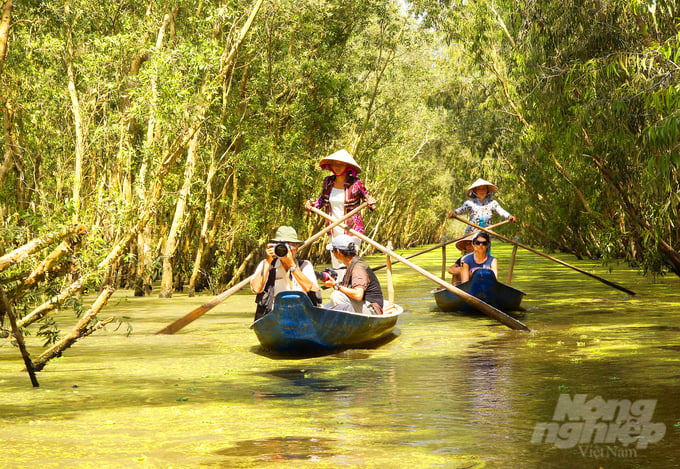May 20, 2025 | 04:40 GMT +7
May 20, 2025 | 04:40 GMT +7
Hotline: 0913.378.918
May 20, 2025 | 04:40 GMT +7
Hotline: 0913.378.918

Tra Su Melaleuca forest, located in An Giang province, is part of Vietnam's special-use forest system and was designated as a landscape protection area in 2005. Photo: Le Hoang Vu.
An Giang Department of Agriculture and Rural Development, in collaboration with WWF, is implementing this project to restore wetlands and natural processes in the Mekong Delta through measures to rehabilitate special-use and protective Melaleuca forests in the Tra Su Melaleuca forest landscape protection area in Tinh Bien town.
The project will focus on researching and implementing scalable Nature-based Solutions (NbS) with potential for large-scale investment throughout the upper Mekong Delta. This will contribute to the overarching goal of conserving the biodiversity of Vietnam's freshwater ecosystems while ensuring sustainable livelihoods for local communities.
Tra Su Melaleuca forest, located in An Giang province, is part of Vietnam's special-use forest system and was designated as a landscape protection area in 2005. With a core conservation area of 845ha and a buffer zone of over 1.100ha, this area annually receives floodwaters directly from the Mekong River during the rainy season, helping to maintain the natural seasonal wet-dry cycle of the wetland. The main habitats of Tra Su include Melaleuca forest, swamps and grasslands. The flora in Tra Su is diverse, with 140 species, most notably the melaleuca trees and a dense layer of floating water plants.
The fauna in this area is also quite rich, with at least 70 recorded bird species, including two species listed in Vietnam's Red Data Book: Mycteria leucoce (a stork species) and the oriental darter (snakebird). There are 11 species of mammals, including rare bats, and at least 25 species of reptiles and amphibians. Additionally, the forest is a year-round habitat for 10 native fish species and 13 migratory fish species during the flood season, two of which - Chitala ornata (scientific name) and white catfish - are endangered.
According to Mr. Nguyen Duc Duy, Deputy Director of the An Giang Department of Agriculture and Rural Development, the Mekong NbS project is being implemented from 2023 to 2025 to protect and restore wetland habitats and the natural processes of the delta, such as free-flowing water, sediment accumulation, and silt deposition in the buffer zone.
Through the implementation of various activities in and around the Tra Su Melaleuca Forest, the project aims to provide significant support to the Tra Su Forest Management Board. This includes planting 60ha of new forest and nurturing 100ha of degraded forest, focusing on the restoration of habitats and native species. The project will employ effective management strategies and hydrological regulations tailored to the specific needs of each sub-zone, ensuring that biodiversity in the core area is adequately protected and monitored. Furthermore, outside the buffer zone, flood-based livelihood models will be introduced. These models are designed to offer not only economic benefits but also environmental advantages, while simultaneously fostering the involvement and support of local communities for sustainable development in the region.
Translated by Phuong Linh
![Reducing emissions from rice fields: [Part 1] Farming clean rice together](https://t.ex-cdn.com/nongnghiepmoitruong.vn/608w/files/news/2025/05/05/z6509661417740_a647202949c539012a959e841c03e1d3-nongnghiep-143611.jpg)
(VAN) Growing clean rice helps reduce environmental pollution while increasing income, allowing farmers to feel secure in production and remain committed to their fields for the long term.
/2025/05/19/5136-1-144800_230.jpg)
(VAN) The Nghe An Provincial People's Committee has just approved the list of beneficiaries eligible for revenue from the Emission Reductions Payment Agreement (ERPA) in the North Central region for the year 2025.

(VAN) 14 out of 35 domesticated elephants in Dak Lak province have had their living conditions improved, with 11 of them currently participating in the non-riding elephant tourism model.

(VAN) Muong Nhe Nature Reserve hopes that being upgraded to a national park will lay the foundation for forest protection efforts to be carried out in a systematic, modern, and sustainable manner.
/2025/05/16/3923-2-171845_52.jpg)
(VAN) Lower costs, higher yields, and improved soil quality are outstanding benefits that soybeans bring when integrated into the crop rotation system.

(VAN) The 'For a Green National Environment' programme aims to promote a green lifestyle, support businesses in implementing ESG practices, and turn Net Zero commitments into concrete actions.

(VAN) Cold-barn systems efficiently manage environmental and temperature conditions, which aids in the prevention of respiratory diseases in pigs and protects them from the vectors that transmit African swine fevers.